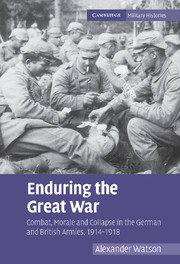Book contents
- Frontmatter
- Contents
- List of plates
- List of figures
- List of tables
- Acknowledgements
- List of abbreviations
- Map: The Western Front 1914–1918
- Introduction
- 1 War of endurance
- 2 Why men fought: combat motivation in the trenches
- 3 Self-deception and survival: mental coping strategies
- 4 Junior leadership: command, cohesion and combat motivation
- 5 Morale and military endurance
- 6 The German collapse in 1918: strike, mutiny or an ordered surrender?
- Conclusion
- Appendix 1 Walter Ludwig's study of Württemberg soldiers' coping strategies
- Appendix 2 Psychiatric casualties in the German and British armies
- Appendix 3 Military ranks and status in the German and British armies
- Glossary of German terms
- Bibliography
- Index
5 - Morale and military endurance
Published online by Cambridge University Press: 05 February 2014
- Frontmatter
- Contents
- List of plates
- List of figures
- List of tables
- Acknowledgements
- List of abbreviations
- Map: The Western Front 1914–1918
- Introduction
- 1 War of endurance
- 2 Why men fought: combat motivation in the trenches
- 3 Self-deception and survival: mental coping strategies
- 4 Junior leadership: command, cohesion and combat motivation
- 5 Morale and military endurance
- 6 The German collapse in 1918: strike, mutiny or an ordered surrender?
- Conclusion
- Appendix 1 Walter Ludwig's study of Württemberg soldiers' coping strategies
- Appendix 2 Psychiatric casualties in the German and British armies
- Appendix 3 Military ranks and status in the German and British armies
- Glossary of German terms
- Bibliography
- Index
Summary
Morale in the British Expeditionary Force, 1914–17
The question of what constitutes ‘morale’, the common shorthand for military resilience and combat motivation, lies not only at the heart of this book but also at the centre of twentieth-century literature on battlefield performance. Scholars and soldiers have generally defined the quality by outlining its component parts. The psychiatrist Frederick J.Manning, for example, has argued that a range of individual and group factors, including on one hand, the satisfaction of biological and psychological needs, and on the other, high esprit de corps, together produce good ‘morale’. Shelford Bidwell similarly contends that culture, psychological constitution, commitment to war aims, training and conditioning, integration into ‘primary groups’ and confidence in leaders are the main ingredients of the quality. An even more thorough but diffuse explanation of the term was provided by the veteran, journalist and historian S.L.A. Marshall:
Morale is the thinking of an army. It is the whole complex body of an army's thought: The way it feels about the soil and about the people from which it springs. The way that it feels about their cause and their politics as compared with other causes and other politics. The way that it feels about its friends and allies, as well as its enemies. About its commanders and goldbricks. About food and shelter. Duty and leisure. Payday and sex. Militarism and civilianism. Freedom and slavery. Work and want. Weapons and comradeship. Bunk fatigue and drill. Discipline and disorder. Life and death. God and the devil
- Type
- Chapter
- Information
- Enduring the Great WarCombat, Morale and Collapse in the German and British Armies, 1914–1918, pp. 140 - 183Publisher: Cambridge University PressPrint publication year: 2008



